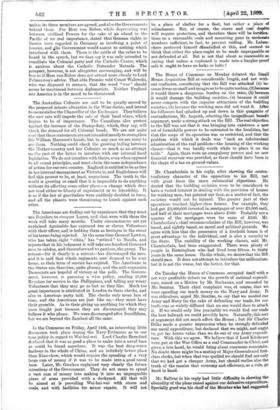The House of Commons on Monday debated the Small • House
Acquisition Bill at considerable length, and not with- out confusion, considering that the Bill was attacked (1) be- cause it was so small and meagre as to be quite useless, (2)beeause it would throw a dangerous burden on the rates, (3) because it would damage the building societies, (4) because it could never compete with the superior attractions of the building societies, (5) because the working men did not want it. After his followers had splashed up and down in this quagmire of contradictions, Mr. Asquith, selecting the insignificant benefit argument, made a strong attack on the Bill. The real objection to the Bill was not that it was bringing into existence a new set of formidable powers to be entrusted to the localities, hit that the scope of its operation PM so restricted, and that the problem with which it deals was "such an infinitesimal adumbration of the real problem—the housing of the working classes—that it was hardly worth while to place it on the table." Again, there were no compulsory powers and no new financial reservoir was provided, as there should have been in the shape of a tax on ground-values.






































 Previous page
Previous page